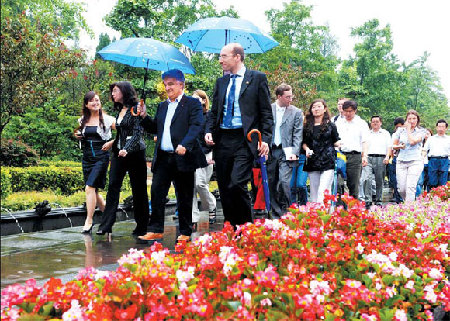
EU Ambassador to China Serge Abou (front, holding umbrella) joins one of the first groups of tourists visit Dujiangyan project, the world's oldest irrigation project, as it reopens on Saturday to the public after last month's earthquake in Sichuan.
He Ping, a 52-year-old taxi driver in Chengdu, capital of Sichuan province, drove a passenger 48 km northwest of the city to Lidui Park yesterday morning.
Upon discovering the park - the site of Dujiangyan, the world's oldest operating irrigation project - was open to visitors free of charge, he paid a quick visit.
The park's irrigation project was named as a World Heritage Site by UN cultural body UNESCO in 2000.
"I was pleasantly surprised to see that only some bricks and tiles have fallen from buildings near the site, and the glass encircling a stone statue of Li Bing (the project's constructor) built in the Eastern Han Dynasty (AD25-220) was shattered, but the dam is intact," he said.
Dujiangyan Irrigation Project administrative bureau official Cui Wei said the park will be open free of charge for three months to promote tourism in the wake of the May 12 earthquake.
"The promotional event follows the Sichuan tourism administration's decision to partially reopen the provincial tourism market on June 15," he said.
From the day of the quake, the National Tourism Administration asked individuals and tour groups to refrain from visiting Sichuan.
Sichuan reopened 12 cities and one prefecture to tourists yesterday to revive its once-booming tourism industry.
These include Zigong, Panzhihua, Luzhou, Suining, Neijiang, Leshan, Nanchong, Yibin, Guang'an, Dazhou, Meishan and Ziyang, and the Liangshan Yi autonomous prefecture.
It partially opened Chengdu to tourists, although several major attractions were damaged in the quake, said Zhang Gu, director of the Sichuan provincial tourism administration.
"Sichuan will encourage residents of the province to visit its tourism sites and would also ask people from other provinces and cities who are helping with post-quake reconstruction to organize trips to Sichuan," he told China Daily in Dujiangyan.
The quake cost the province's tourism sector more than 50 billion yuan ($7.2 billion) in losses.
However, it didn't wreak havoc on the province's World Heritage Sites.
It only partly damaged Mount Qingcheng and Dujiangyan, and left Jiuzhaigou, Huanglong, Mount Emei and the Leshan Giant Buddha unscathed.
Sichuan is now developing a reconstruction plan for its tourism sector to be implemented in phases over two years, by which time authorities expect a full recovery.
In the first phase, to begin in the second half of this year, authorities would highlight the Chengdu-Mount Emei-Leshan Giant Buddha route to show Sichuan is safe for tourists. In the second phase, to begin next year, it would promote the entire sector.
The worst-affected places, including Beichuan county, the Tangjiashan earthquake lake area and Hanwang town, will be built into world-class earthquake museums in three years, he said.
Sichuan will raise nearly 200 billion yuan from both the government and private investors to restore the sector, according to the plan.
Tourism revenue in Sichuan was 121.7 billion yuan last year, accounting for 11.6 percent of the province's gross domestic product.
More than 400,000 people work in the industry.
(China Daily June 16, 2008)